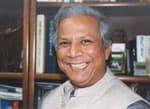BANGLADESH/NORWAY
 |
|
|
Norways Nobel Institute broke with tradition in October when, for the first time ever, it awarded its coveted Nobel Peace Prize to a banker and a financial institution. Grameen Bank, and its founder Muhammad Yunus, won the joint award for their program, Microcredit. Through Microcredit, Grameen Bank has been providing micro loans to the poorest segments of society for the past 30 years.
Explaining its decision to award the prize to a banker, the Nobel Institute said: Loans to poor people without any financial security had appeared to be an impossible idea. From modest beginnings three decades ago, Yunus has, first and foremost through Grameen Bank, developed Microcredit into an ever more important instrument in the struggle against poverty.
In addition, the institute chose to honor Yunus and Grameen as visionaries that provided a model on which other institutions have since based micro-loan programs of their own. Numerous such solutions have sprung up around the globe, offering microfinance to those without the credit history to warrant a traditional loan solution.
The Microcredit program provides small loans without collateral to those in the greatest need. When he started the project in Bangladesh in 1976, Yunuss goal was to design a credit delivery system to provide banking services to the rural poor. The highly successful project developed into a highly successful bank, which had 6.61 million borrowers as of May this year. Of those borrowers, 97% are women. Micro-credit has proved to be an important liberating force in societies where women in particular have to struggle against repressive social and economic conditions, said the Nobel Institute.
Based on the principal of development from below, the goals of the bank are to extend banking facilities to those without resources; to stop the exploitation of the poor by money lenders; to create self-employment opportunities for large unemployed rural populations; and, as the bank explains in a report, to reverse the age-old vicious circle of low income, low saving and low investment, into a virtuous circle of low income, injection of credit, investment, more income, more savings, more investment, more income.
As of last year, Grameen Bank accounted for more than 1.5% of GDP in Bangladesh.
Denise Bedell



